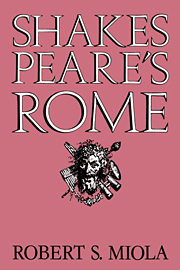Book contents
- Frontmatter
- Contents
- Acknowledgments
- Notes on sources
- I The roads to Rome
- II The Rape of Lucrece: Rome and Romans
- III Titus Andronicus: Rome and the family
- IV Julius Caesar: Rome divided
- V Antony and Cleopatra: Rome and the world
- VI Coriolanus: Rome and the self
- VII Cymbeline: Beyond Rome
- VIII Conclusion
- Index
VII - Cymbeline: Beyond Rome
Published online by Cambridge University Press: 28 October 2009
- Frontmatter
- Contents
- Acknowledgments
- Notes on sources
- I The roads to Rome
- II The Rape of Lucrece: Rome and Romans
- III Titus Andronicus: Rome and the family
- IV Julius Caesar: Rome divided
- V Antony and Cleopatra: Rome and the world
- VI Coriolanus: Rome and the self
- VII Cymbeline: Beyond Rome
- VIII Conclusion
- Index
Summary
Generally regarded as a tragicomedy or romance (each genre defined differently by different critics) and studied in the context of Shakespeare's last plays, Cymbeline has attracted little attention as Shakespeare's final Roman work. Tacitly most assume that the incarnation of Rome in Cymbeline is insignificant next to that in Lucrece, Titus Andronicus, and the Plutarchan tragedies. After all, the titular figure is a British king ruling in Britain, and Rome is merely the other place in opposition, domain of an Emperor we never see and of characters who seem more like Renaissance Italians than classical Romans. The play affords only the briefest glimpse of the ancient city, that strangely unmoored scene (III.vii) in which the senators serve the tribunes a commission to levy soldiers for the upcoming war. The Capitol is mentioned only once in a blatant lie (I.vi.106), and no other familiar landmarks create atmosphere or establish place. Physical detail is kept to a minimum, and only one character, Caius Lucius, embodies anything like the stalwart Romanitas we observe in Lucrece, Titus, Brutus, Antony, Caesar, and Coriolanus. The seriousness of Shakespeare's previous Roman efforts, resulting from an abiding interest in character and politics, here yields to a cavalier nonchalance that tolerates inconsistencies, eschews political analysis, and trumpets its own artifices. Cymbeline's liberal mixing of incompatible characters, plots, themes, conventions, and styles has largely disqualified it as successor to the masterful Antony and Cleopatra and the carefully wrought Coriolanus.
Yet, Rome is undeniably present in Cymbeline. The city is a major locality in the play, and its historical skirmishes with Britain make up a good part of the action.
- Type
- Chapter
- Information
- Shakespeare's Rome , pp. 206 - 235Publisher: Cambridge University PressPrint publication year: 1983



